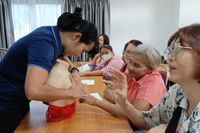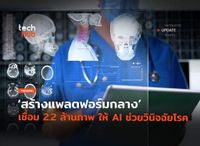In a significant health initiative, the Thap Ma Municipality in Rayong Province has launched a breast cancer screening project aimed at early detection and prevention. This program, which utilizes mobile mammography equipment, is set to run from April 22 to 23, 2025, and targets 100 women at risk in the Thap Ma district.
N.S. Reveeya, the acting mayor of Thap Ma Municipality, emphasized the importance of this initiative during the project's opening ceremony. She highlighted alarming statistics from the National Cancer Institute indicating that approximately 140,000 new cancer cases are diagnosed each year in Thailand, with breast cancer being among the top five leading causes of cancer-related deaths.
According to the Department of Health, the leading cancers affecting Thai women include liver and bile duct cancer, lung cancer, breast cancer, cervical cancer, and leukemia. In response to these statistics, the Thap Ma Public Health Center has recognized the need for proactive measures to combat breast cancer, particularly through early detection.
The screening project aims to raise awareness about breast cancer self-examinations and encourage women to undergo regular screenings. The initiative includes three methods of examination: self-examination education, professional medical examinations, and mammography.
Meanwhile, the Thai government is taking further steps to enhance healthcare through technology. The Ministry of Higher Education, Science, Research and Innovation has partnered with several organizations to launch the Medical AI Data Platform, which aims to streamline medical diagnoses using artificial intelligence (AI). This platform will utilize a vast database of 2.2 million medical images, enabling healthcare providers to share, connect, and utilize these resources effectively.
Ms. Supamas Issarapakdee, the Minister of Higher Education, stressed the importance of integrating AI into healthcare systems, stating that the initiative aims to enhance diagnostic accuracy and accessibility while reducing disparities in healthcare services. The Medical AI Consortium, which supports this platform, includes six key institutions, such as the Department of Medical Services and prestigious medical faculties from various universities.
Dr. Chujit Limpichumnong, Director of the National Science and Technology Development Agency (NSTDA), explained that the development of the Medical AI Data Platform is a crucial investment in the country's healthcare infrastructure. He noted that the platform is designed not only to serve as a data repository but also to facilitate the development of AI tools that can assist researchers and medical professionals in creating innovative healthcare solutions.
The platform will encompass several components, including data management, AI modeling, and AI service deployment. The data management aspect will ensure secure collection and storage of medical images while maintaining governance over data access rights. The AI modeling component will allow researchers to build AI models without extensive programming knowledge, utilizing high-performance computing resources. Finally, the AI service deployment segment aims to implement validated AI models in real-world healthcare settings.
With the Medical AI Data Platform, the consortium hopes to address the challenges of data collection and standardization in the medical field. The initiative promotes a collaborative approach, encouraging hospitals and medical institutions to share information and contribute to a comprehensive healthcare database.
In addition to breast cancer screening, the application of AI in healthcare has shown promising results in other areas, such as diabetes-related eye disease screening. Studies indicate that AI can significantly enhance the speed and accuracy of diagnoses compared to traditional methods. For instance, AI demonstrated a sensitivity of 97% and specificity of 96% in screening for diabetic retinopathy, outperforming medical personnel's sensitivity of 74% and specificity of 98%.
These advancements highlight the potential of AI to alleviate the burden on healthcare professionals, increase access to medical services, and improve patient outcomes. As Thailand continues to grapple with a growing number of diabetes cases—approximately 6 million individuals—the integration of AI into screening processes can expedite diagnosis and treatment, ultimately reducing the risk of complications.
Overall, both the breast cancer screening project and the Medical AI Data Platform represent significant strides toward improving public health in Thailand. By prioritizing early detection and leveraging technology, these initiatives aim to enhance the quality of healthcare services and ensure that more individuals receive timely and effective medical attention.



